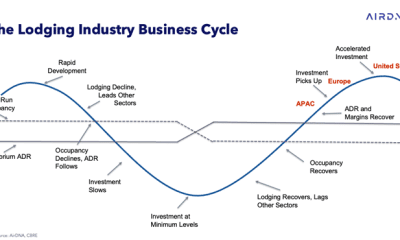
Listing sites have been hard at work this year implementing changes that have far reaching effects for vacation rental managers, namely withholding contact information until much later in the booking process.
As much conversation as there is in the industry about the shifts in policy, this isn’t a new problem. Listing sites have been inching their way toward more involvement in the booking process for a long time, and this is just one more step in that direction. Consider it an emergency smoke signal that it’s time to re-evaluate your listing site dependency if you have one. This direction is the likely future of listing site evolution and even more changes are coming down the pike. But for vacation rental managers, all profitable paths have always led back to direct bookings. It’s time to prioritize, strategize, and reinvigorate them. This doesn’t mean listing sites don’t matter because we all know they do, but there needs to be a balanced strategy in place in how they handle distribution.
The Impact of the Changes
According to HomeAway, 71% of guests will call before they book online to ask questions and confirm their choice, and Phocuswright reports that 34% of travelers used the phone to book their last stay in a private accommodation.[1]
When tracked by property managers, high consideration stays—and most vacation rental reservations are—typically generate at least one phone call and multiple inquiries across channels before the reservation is confirmed.
However, with listing sites withholding guest information from the property manager, phone calls will necessarily decrease. Notably, they won’t be able to call the property to ask questions beforehand which can have a ripple effect in guest satisfaction. This means the opportunity to build a relationship with the guest and create brand trust, one that persuades them to book, diminishes. For instance, NAVIS clients know that having an agent call the potential guest as quickly as possible after an inquiry arrives is essential to achieving the reservation (and it opens the door to email follow up.) This critical touch point is lost with most listing sites at this point.
A 5% decrease in call volume means that you must convert 2% more from the remaining call demand in order to stabilize revenue.
You must do better with the demand you already have in order to maintain your bookings and revenue when calls decline.
Other problems arise, too. For instance:
- Data flatline. For some, that is. When property managers have access to guest data at the inquiry stage, valuable data for not-booked guests can be captured. While this was a big threat even just a week ago, NAVIS has been the first to engineer an update in response to Homeaway’s changes that allows for property managers to capture data from inquiring guests and merge it into one lead.
- Without the ability to reach out to the guest right away, vacation rental managers have less influence over the sale, they also have less ability to deliver a superior guest experience.
- Inability to vet guests yet still accountable to owners for ensuring the right guests reserve.
- Listing sites now own the guest.
- Property managers must log in to three or four different dashboards to manage guests now.
- Brand identity on listing sites will be lost.
Until now, the industry has simply enjoyed more access to the guest, which has in turn created greater dependency on listing sites. Brise Carpenter, Director of Client Success at NAVIS explains, ”Vacation rentals can leverage this inevitable evolution as an opportunity to re-evaluate how they use listing sites going forward. All profitable paths have always led back to direct bookings and it’s a great time to prioritize, strategize, and reinvigorate them. This doesn’t mean listing sites don’t matter because we all know they do, but there needs to be a balanced strategy in place in how they handle distribution.”
How to Survive & Thrive
Though the listing site changes elicit groans, it’s where we’ve all known the industry would go eventually. It doesn’t change your goals. Instead, it should change your strategy. The best strategy for dealing with this situation is the one you needed all along in order to be more profitable. Here are some tactical steps for navigating this situation quickly.
1. Let smart data control your business
Are you going to let the listing sites and their ever-changing algorithms and policies control your business? Or will you, instead, choose a tool that isolates the avenues that are actually producing revenue, and follow up by building a strategy that puts your money where it will bring the greatest return?
2. Use a prospect database; upload to a CRM to make it actionable
NAVIS has the ability to capture HomeAway guest inquiry details and integrate into them one lead so that property managers can clearly see the path to purchase, avoid duplicating responses, and continue to track not-booked leads. Consider the ramifications of not doing this. If you spend $100,000 on marketing and you are converting at 20%, then $20,000 of that budget goes toward acquiring guests. This means you’ve spent $80,000 on those that did not book. This $80,000 is mostly wasted if you don’t capture that not-booked guest data, but it doesn’t have to be. That $80,000 can, instead, become actionable when it is captured by software like NAVIS’s and a remarketing plan is put in place. Start capturing not-booked data immediately while it’s still available so that those not-booked guests eventually become your guests instead of the customer of the listing site.
3. Use past guest database
Put your precious past guest database to good use. Create an outbound program that includes phone calls and email in order to bring guests back. It’s much less difficult to sell a vacation rental guest the second time around and consider it prevention against listing sites snatching up a guest that’s rightly yours.
4. Increase reservation inquiry conversions both online and offline
The idea that direct bookings are website bookings is a misunderstanding promoted heavily by marketing firms and digital media. It can also be a crutch for your marketing team who think it’s the only trackable channel. Direct bookings come from both online and offline sources—and often guests are bouncing back and forth between them on their path to purchase. To understand your revenues, you must calculate both conversions and booking ratios, and this must include online and offline sources. You must be able to see clearly that a guest did research online before calling to book or, alternatively, called to inquire before booking on your website. This is a true picture of your business—and it’s available.
5. Master the basics first
You must level the playing field. Be more competitive by being the best you can be at email, as fast as you can be at all types of follow-up, and consistently focusing on service in order to encourage repeat guests. Make it your mission to capture and own every guest.
6. Diversify your marketing: PPC, website, offsite listings, SEO
The online and offline world are merging and diversifying your marketing is as important as ever. Evaluate your marketing plan to ensure you are doing all you can to boost your presence both offline and online, and be sure to include your phone number prominently in all marketing materials to drive profitable phone calls.
7. Consider listing sites a marketing tool in your arsenal
Third parties are not out of the picture. We’re advocating for being smarter and more in control of your business, your data, and your guests. That said, listing sites bring new eyeballs and credibility to the vacation rental industry, which is still in its mainstream infancy. We need this to grow, not decrease… and listing sites are definitely a part of the program.
8. Optimize your listing site marketing investment
Review the segmented performance of different homes and amenities on the listing sites and put in the effort to adjust the listing level or add on marketing services to appropriate homes. If you have homes that just aren’t performing (maybe low-quality amenities or bad reviews), don’t waste your money. Instead, take them off the listing site and find another way to promote.
9. Homeowner education
Homeowners expect to see their homes on all of the listing sites so vacation rental managers will need to educate owners about the value of moving the marketing budget to more profitable outlets. Data analytics is the first step in explaining why there are better ways to represent the property. Also key is proactively communicating value and performance to owners.
10. Monetize
Evaluate your marketing spend and monetize its performance. Many vacation rental managers track only where the bookings came from without tracking conversion rates. Being smarter at marketing spend—spending on the highest ROI outlets instead of booking volume—means tracking the lead to booking and determining which channel has the highest conversion rate for the lowest dollar. With NAVIS software, for instance, every lead can be tracked, from their Google search term to a phone call back to a website and beyond, so you can see where the conversion initiated, not just where it ended.
Hotels have been dealing with third-party encroachment for many years. It has created an all-out “war” with millions spent educating guests to book directly. Vacation rentals are in a similar, but not new, position. Vacation rentals must use listing sites more wisely going forward in order to stay profitable while gaining exposure.












The only way out is open your chubby wallet….the owner costs to run a vacation rental are peanuts compared to an apartment house….internet advertising is seemingly expensive, the only cost/effective medium that works day in day out. You need to advertise, so pay some fees to the metasearch engines and enjoy your consistent bookings.
Pro investors use proven advertising mediums in real estate investing….the whining newbies have no idea what adversity pro investors have gone through to build a business management system to cope with disapointments in operational income property management.
More cheeky happy talk!
Here is the plan. Adapt to working with the big dogs and ride out the coming shake out of metasearch sites and ballooning property inventory rift of amateur real estate speculators.. Develop twice a year contacts from prior guests either mail or boring unread emails. Offer midweek discounts tied to weekend stays. Have a catchy name for your casa in big dog websites. Develop a low cost simple/direct web site with your casa’s catchy name. Lots of pictures and downplay all your control freak rules, no pets of course…what respectable owner presents a stinking/ allergy infested casa to high end clientel…..in yada yada in web site stress convienience, local people stuff like grocery store, eating joints the locals like, respectable night life, plays, musicals and other truly unique content etc. Never pay web site placement promoters who actually live in grandma’s basement, a website expense over 500 bucks is insane….try wix.com and DIY. Change is inevitable…..devote time and dollars to adapting, juking, having a spiffy property at all times, discussing/reading/coping with ONLY positive people, media, online posts. Be patient and in long term you win…..simple….